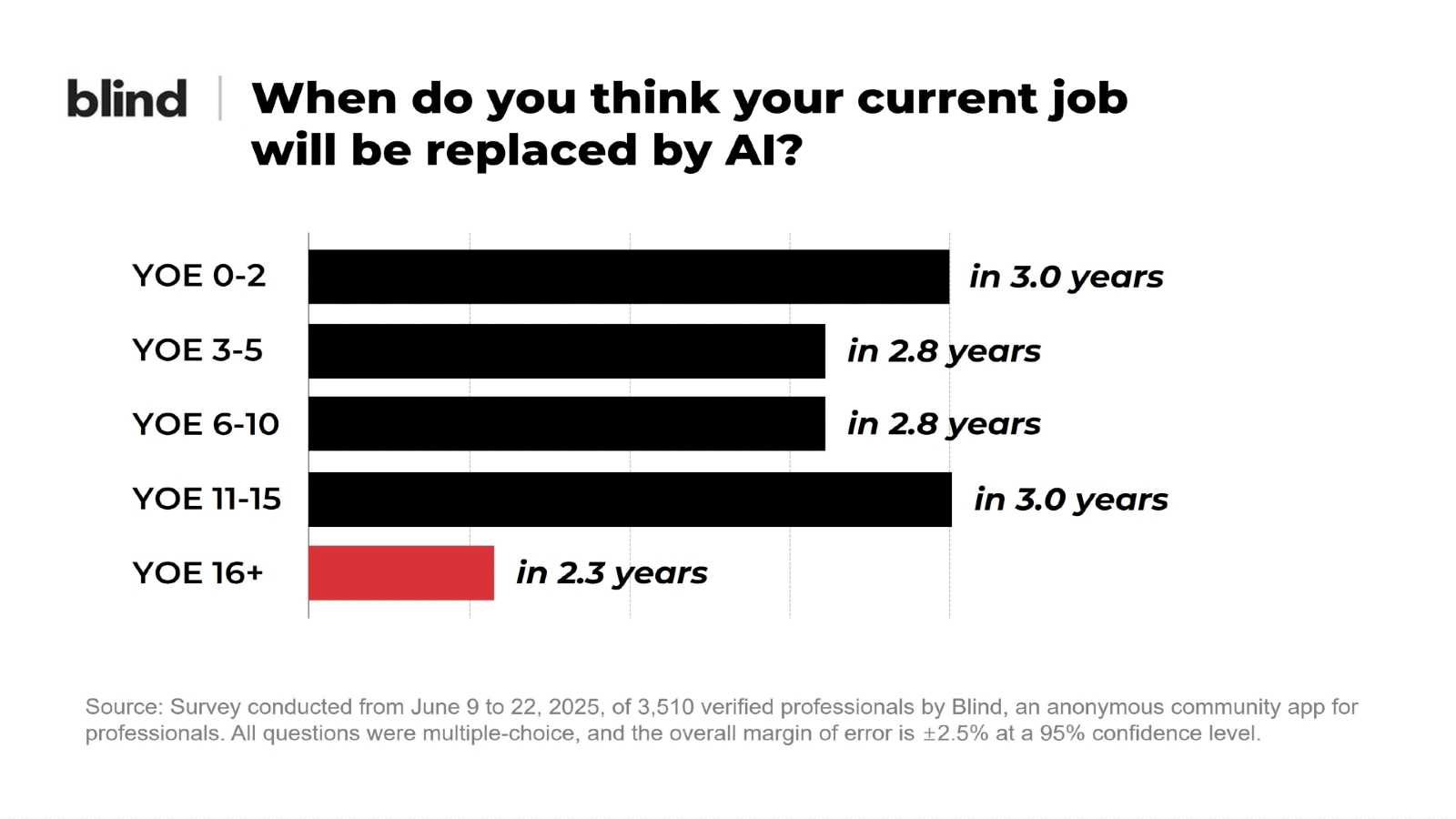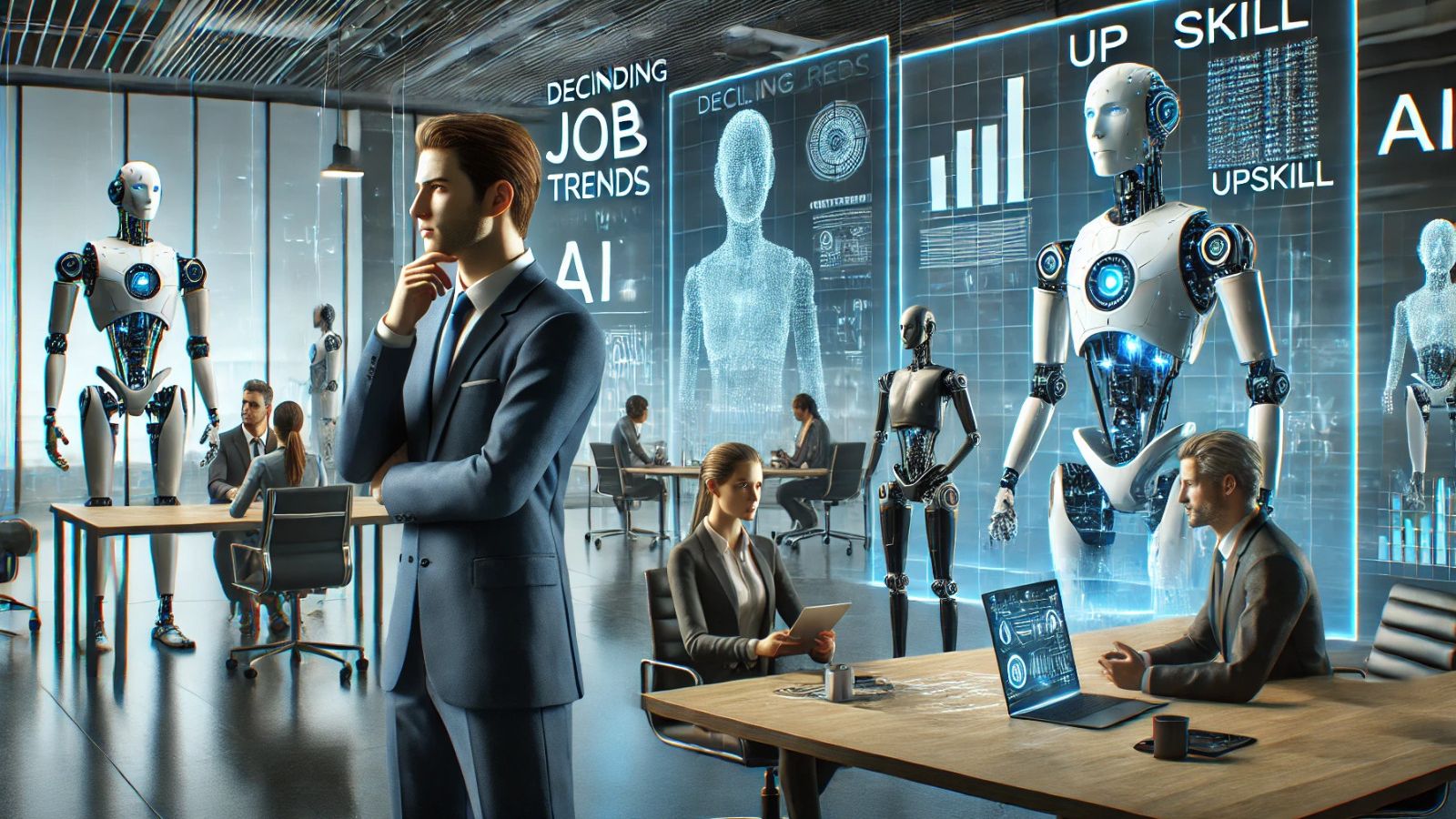As the rise of artificial intelligence accelerates and more workplaces become ‘AI-ready,’ a new survey reveals how secure professionals feel in the AI age. But the findings do not paint a positive picture.
A new survey conducted by Blind, an anonymous network with more than 5 million verified employees discussing their employers and workplace policies—from pay to return-to-office—reveals that 74 per cent of professionals anticipate their roles will be impacted within the next three years. Among the surveyed professionals, only 26 per cent said their jobs would be secure even when AI is fully deployed in their workplace.
Blind, which bills itself as a “trusted community where verified professionals connect to discuss what matters most,” conducted the survey from June 9 to 22, 2025, collecting responses from 3,510 verified professionals on the platform. Although the survey targeted US professionals, the overall sentiments regarding job security and the threat of AI are felt universally. Respondents answered multiple-choice questions about their expectations and experiences with AI in the workplace.
Based on the survey, professionals with over 16 years of experience are more concerned that AI will replace their jobs within 2.3 years. In comparison, younger professionals with less experience estimate longer timelines. For example, those with under 2 years of experience expect it will take 3 years for AI to replace their roles. Among all respondents, the average expected timeline for AI-driven job replacement is 2.8 years.
The survey notes that variations in AI job replacement expectations are more pronounced across companies than by years of experience. For instance, employees at Salesforce expect AI to replace their jobs in 2.3 years, while those at Google estimate 2.5 years, and Microsoft employees expect it will happen in 2.6 years. In contrast, workers at Uber and PayPal expect AI will take 3.2 years and 3.3 years, respectively, to replace their roles.
The survey also explored how artificial intelligence is already being deployed across tech companies, with 43 per cent of professionals admitting that some of their tasks have already been reduced or eliminated due to AI adoption. Meanwhile, 23 per cent reported reactive discussions or growing concern within their teams about the use of AI, while 30 per cent said they have seen no noticeable changes so far.
More than half of the respondents at Visa (58%), Grab (54%), and Walmart (54%) said that some of their tasks have already been reduced due to AI. A similar sense of AI deployment is evident at other companies as well, including Amazon (45%), LinkedIn (44%), and Adobe (46%).
Story continues below this ad
There is a growing sentiment that AI will impact industries such as technology, finance, law, and media, with white-collar jobs being affected the most. Research from the American think tank, The Brookings Institution, shows that AI could replace more than half of the tasks carried out by entry-level roles, including market research analysts, sales representatives and graphic designers.
 Based on the survey, professionals with over 16 years of experience are more concerned that AI will replace their jobs within 2.3 years.
Based on the survey, professionals with over 16 years of experience are more concerned that AI will replace their jobs within 2.3 years.
How to make yourself relevant in the AI-ready job market
AI is here, and automation won’t stop—it will only grow and impact jobs across all sectors. Instead of worrying, here’s what professionals can do to weather potential layoffs (if they happen) and improve job security.
Upskill yourself
There is no harm in upskilling and expanding your existing skills. The best way to do this is to learn about new technologies and see if they can help you grow in your current career path. If you learn them quickly, they may even open up new career opportunities. Look for online certifications and courses—there are plenty available.
Be ready to ‘reskill’ yourself
In the corporate world, one of the best ways to grow quickly is by reskilling, especially if you work in tech. Maybe you have a BTech degree and already work at a tech company, but as AI becomes part of every aspect of life, it’s time to reskill. That degree alone won’t be enough to secure a job in an AI-driven market.
Story continues below this ad
Develop people skills
No matter how widely AI is deployed across the workplace, humans are still needed in the loop. Building strong teams, resolving conflicts, and mentoring won’t become obsolete anytime soon. Companies will still need team leaders, which is why developing people skills is so important. This may give you an edge over everyone else.
Build your network
Spend time on LinkedIn and explore ways to expand your connections. Not only will this help grow your network, but it will also connect you with people in your field. If possible, start a YouTube channel to showcase your knowledge and skills in your area of expertise. This will further help you grow and strengthen your network.




Average Rating